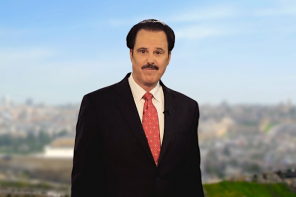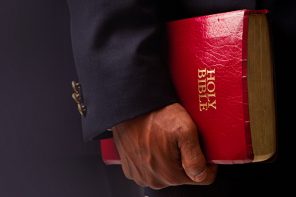My Jesus Year: A Rabbi’s Son Wanders the Bible Belt in Search of His Own Faith
By Benyamin Cohen
HarperCollins, 2008
Christian houses of worship hold a complicated position in the Jewish psyche. From our ancestors, we may inherit the notion that they are dangerous and blasphemous places, exuding both the seduction of apostasy and the violence of persecution. Growing up in their shadow, we discover our otherness: while attending a friend’s first communion, my mother and I were the only ones not to kneel.
And yet the very fact that I was in attendance indicates that some things have changed since the Middle Ages; that to a Jew born in late-20th century, multicultural America the narthex is a semipermeable membrane. As a grown man, and an ordained rabbi, I attend Christmas services yearly with my converted wife’s family, and serve a Jewish community that rents space from Protestants. And so I come to define my Judaism through a far more nuanced relationship with church.
This relaxed tension is what makes a book like Benyamin Cohen’s My Jesus Year, just out in paperback, possible. It is only a mildly insightful book, interesting more for what it means than what it says. In the throes of a prolonged spiritual torpor, Cohen, an Orthodox Jew in his mid-thirties, proposes (to his literary agent, apparently) to spend a year visiting 52 churches, one for every Sunday. The result is a prime example of the mushrooming genre of stunt writing (like A.J. Jacobs’ The Year of Living Biblically) in which a contrivance of questionable philosophic value is carried to its logical conclusion; if for no other reason than to further the career of an ambitious young writer.
It’s not that I doubt the veracity of Cohen’s religious crisis. Losing his mother to a brain aneurysm as an adolescent, he was raised predominantly by his father, an overbearing rabbi. By the time he reached his twenties, whatever thrill or solace Judaism afforded him had been snuffed out, and he felt “suffocated” by its arbitrary strictures. All along, Christianity tempted at the fringes of his life, signifying not salvation through Jesus but mundane liberation from the obligations of Jewish Orthodoxy. “While my upbringing was defined by what I couldn’t do,” he writes, “it seemed to me that Christian kids had it all. In my eyes, they were wealthy, happy, and able to watch TV whenever they wanted.”
His discussion of the young Orthodox bourgeoisie—Jews like himself who he terms “metrodox,” raised with the social expectations of their worldly peers while simultaneously beholden to an arcane and restrictive code of behavior—is actually rather compelling. “Being tugged in one direction by the secular world and in another by the religious world, they have styled their own compromise,” he says, “[and yet] they also feel an unbearable sense of loneliness and despair.”
But the extent to which Cohen understands his own motivations for journeying into Christendom is unclear. “I’m hoping to find something in a church that will reconnect me to my Judaism,” he writes, a sentiment that elsewhere he codifies into the more marketable slogan “I want Jesus to make me a better Jew.” But what does this mean? “[You] needn’t worry that I might leave Judaism,” he assures his wife (and thereby his reader) toward the beginning of his escapade. “I [have] no intention of doing any such thing.” Thus ensconced within safe parameters, he sets out on a circumscribed journey of self-discovery, like Odysseus tied to the mast so that he can hear, but not respond to, the song of the Sirens. The inevitable reconciliation with his faith and his father is preordained from page one, and, because he has actually wagered very little, this spiritual victory seems shallow. Eliding the tribulations of a true wanderjahr, Cohen is more like a groom at a strip club, blowing off steam to make his commitment more palatable.
It might have been different if he weren’t Orthodox—if Cohen hadn’t waited for the seal of approval of his rabbi before undertaking his expedition, and hadn’t assiduously maintained the particulars of Jewish observance throughout the journey. He enters every church garbed in yarmulkah and tzitzit (ritual fringes worn at the four corners of the shirt, as a reminder of the commandments), clearly identified as a Jew and therefore bolstered against any assimilatory undertow. His observations are interesting, if somewhat prurient; the wide-eyed country boy who can’t wait to tell the folks back home what he saw in the big city. But his experience lacks the intensity of those Jews who, suffering alienation from their tradition, have truly tried to lose themselves in another culture (whether Christianity, Buddhism, or punk rock) and whose subsequent return, if it happens, is far more sophisticated.
Cohen is never really challenged, either in his praxis or his theology. He never doubts God, or catches himself thinking that anything in the Jewish world should be altered—apart from adopting the marketing techniques of pop culture evangelists and making synagogue music a little peppier. His epiphanies are generally of the Chicken Soup for the Soul variety: “I’m coming to realize that people of faith come in all shapes and sizes,” he writes, after spending a day in the company of Prince Rahm, of the Atlanta-based Black Hebrews. While it is certainly fascinating, and perhaps admirable, that we have come to a moment in American religious life when an Orthodox Jew can say such a thing, it also betrays a stunning naiveté. The evangelists Cohen seems to enjoy so much, though they might fetishize a Jew, presumably would not reciprocate; Jesus, after all, being the only way to the father. And he has strangely fond words for John Hagee, joining the ranks of shortsighted Jews who refuse to see the profound crackpot anti-Semitism lurking beneath the Texas pastor’s support for Israel.
My Jesus Year therefore represents something of an odd chapter in the history of Jews and church, but one that may very well be indicative of the forces at play in our time. Clearly, if even a nice Orthodox boy can get permission to do it, the act of a Jew entering into a Christian house of worship is no longer as fraught as it once was. But what do we seek there? Cohen’s seems much more a quest for enthusiasm than truth. In this he is joined even by progressive synagogue consultants, who argue that we can look to the habits of roof-raising megachurches for lessons in “getting our groove back,” as if religious community is just one more mass-produced commodity to be stamped at the end of the factory line with a cross, or a crescent, or a star of David.
Differences are ignored, as we unite in the task we all share as religious functionaries in a secular world: filling the seats. And journeys of discovery can seem less like the parable of the man who traveled to a far-off land to learn there was treasure under his house, and more like the tepid Rupert Holmes “Pina Colada Song,” in which bored lovers reignite their passion through a feint at adultery.
I am by no means eager or nostalgic for religious conflict, but, had I been undercover as his book agent, I might have proposed that Cohen take his search to what he may have found a more dangerous arena: the liberal synagogue. Here he might find Jews who, rather than taking quick forays outward so as to get “jazzed up” about the unchanging faith of their fathers, have recognized themselves to be incontrovertibly implicated by their encounter with modernity, truly altered by their intimacy with other faiths, and so struggle just as much to fit Judaism to themselves as they do to fit themselves to Judaism. I suspect he might find this more challenging than a year of controlled visits to the more extravagant locales of American Christianity. The fantastic, after all, is never quite as disconcerting as the uncanny.




